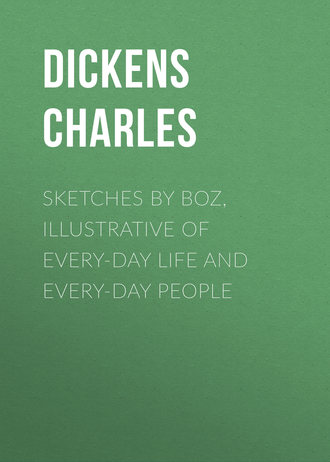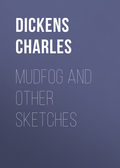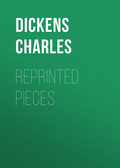
Чарльз Диккенс
Sketches by Boz, Illustrative of Every-Day Life and Every-Day People
The time wore on; half-past eight o’clock arrived; the pastry-cook’s men went ashore; the dinner was completely laid out; and Mr. Percy Noakes locked the principal cabin, and put the key in his pocket, in order that it might be suddenly disclosed, in all its magnificence, to the eyes of the astonished company. The band came on board, and so did the wine.
Ten minutes to nine, and the committee embarked in a body. There was Mr. Hardy, in a blue jacket and waistcoat, white trousers, silk stockings, and pumps – in full aquatic costume, with a straw hat on his head, and an immense telescope under his arm; and there was the young gentleman with the green spectacles, in nankeen inexplicables, with a ditto waistcoat and bright buttons, like the pictures of Paul – not the saint, but he of Virginia notoriety. The remainder of the committee, dressed in white hats, light jackets, waistcoats, and trousers, looked something between waiters and West India planters.
Nine o’clock struck, and the company arrived in shoals. Mr. Samuel Briggs, Mrs. Briggs, and the Misses Briggs, made their appearance in a smart private wherry. The three guitars, in their respective dark green cases, were carefully stowed away in the bottom of the boat, accompanied by two immense portfolios of music, which it would take at least a week’s incessant playing to get through. The Tauntons arrived at the same moment with more music, and a lion – a gentleman with a bass voice and an incipient red moustache. The colours of the Taunton party were pink; those of the Briggses a light blue. The Tauntons had artificial flowers in their bonnets; here the Briggses gained a decided advantage – they wore feathers.
‘How d’ye do, dear?’ said the Misses Briggs to the Misses Taunton. (The word ‘dear’ among girls is frequently synonymous with ‘wretch.’)
‘Quite well, thank you, dear,’ replied the Misses Taunton to the Misses Briggs; and then, there was such a kissing, and congratulating, and shaking of hands, as might have induced one to suppose that the two families were the best friends in the world, instead of each wishing the other overboard, as they most sincerely did.
Mr. Percy Noakes received the visitors, and bowed to the strange gentleman, as if he should like to know who he was. This was just what Mrs. Taunton wanted. Here was an opportunity to astonish the Briggses.
‘Oh! I beg your pardon,’ said the general of the Taunton party, with a careless air. – ‘Captain Helves – Mr. Percy Noakes – Mrs. Briggs – Captain Helves.’
Mr. Percy Noakes bowed very low; the gallant captain did the same with all due ferocity, and the Briggses were clearly overcome.
‘Our friend, Mr. Wizzle, being unfortunately prevented from coming,’ resumed Mrs. Taunton, ‘I did myself the pleasure of bringing the captain, whose musical talents I knew would be a great acquisition.’
‘In the name of the committee I have to thank you for doing so, and to offer you welcome, sir,’ replied Percy. (Here the scraping was renewed.) ‘But pray be seated – won’t you walk aft? Captain, will you conduct Miss Taunton? – Miss Briggs, will you allow me?’
‘Where could they have picked up that military man?’ inquired Mrs. Briggs of Miss Kate Briggs, as they followed the little party.
‘I can’t imagine,’ replied Miss Kate, bursting with vexation; for the very fierce air with which the gallant captain regarded the company, had impressed her with a high sense of his importance.
Boat after boat came alongside, and guest after guest arrived. The invites had been excellently arranged: Mr. Percy Noakes having considered it as important that the number of young men should exactly tally with that of the young ladies, as that the quantity of knives on board should be in precise proportion to the forks.
‘Now, is every one on board?’ inquired Mr. Percy Noakes. The committee (who, with their bits of blue ribbon, looked as if they were all going to be bled) bustled about to ascertain the fact, and reported that they might safely start.
‘Go on!’ cried the master of the boat from the top of one of the paddle-boxes.
‘Go on!’ echoed the boy, who was stationed over the hatchway to pass the directions down to the engineer; and away went the vessel with that agreeable noise which is peculiar to steamers, and which is composed of a mixture of creaking, gushing, clanging, and snorting.
‘Hoi-oi-oi-oi-oi-oi-o-i-i-i!’ shouted half-a-dozen voices from a boat, a quarter of a mile astern.
‘Ease her!’ cried the captain: ‘do these people belong to us, sir?’
‘Noakes,’ exclaimed Hardy, who had been looking at every object far and near, through the large telescope, ‘it’s the Fleetwoods and the Wakefields – and two children with them, by Jove!’
‘What a shame to bring children!’ said everybody; ‘how very inconsiderate!’
‘I say, it would be a good joke to pretend not to see ’em, wouldn’t it?’ suggested Hardy, to the immense delight of the company generally. A council of war was hastily held, and it was resolved that the newcomers should be taken on board, on Mr. Hardy solemnly pledging himself to tease the children during the whole of the day.
‘Stop her!’ cried the captain.
‘Stop her!’ repeated the boy; whizz went the steam, and all the young ladies, as in duty bound, screamed in concert. They were only appeased by the assurance of the martial Helves, that the escape of steam consequent on stopping a vessel was seldom attended with any great loss of human life.
Two men ran to the side; and after some shouting, and swearing, and angling for the wherry with a boat-hook, Mr. Fleetwood, and Mrs. Fleetwood, and Master Fleetwood, and Mr. Wakefield, and Mrs. Wakefield, and Miss Wakefield, were safely deposited on the deck. The girl was about six years old, the boy about four; the former was dressed in a white frock with a pink sash and dog’s-eared-looking little spencer: a straw bonnet and green veil, six inches by three and a half; the latter, was attired for the occasion in a nankeen frock, between the bottom of which, and the top of his plaid socks, a considerable portion of two small mottled legs was discernible. He had a light blue cap with a gold band and tassel on his head, and a damp piece of gingerbread in his hand, with which he had slightly embossed his countenance.
The boat once more started off; the band played ‘Off she goes:’ the major part of the company conversed cheerfully in groups; and the old gentlemen walked up and down the deck in pairs, as perseveringly and gravely as if they were doing a match against time for an immense stake. They ran briskly down the Pool; the gentlemen pointed out the Docks, the Thames Police-office, and other elegant public edifices; and the young ladies exhibited a proper display of horror at the appearance of the coal-whippers and ballast-heavers. Mr. Hardy told stories to the married ladies, at which they laughed very much in their pocket-handkerchiefs, and hit him on the knuckles with their fans, declaring him to be ‘a naughty man – a shocking creature’ – and so forth; and Captain Helves gave slight descriptions of battles and duels, with a most bloodthirsty air, which made him the admiration of the women, and the envy of the men. Quadrilling commenced; Captain Helves danced one set with Miss Emily Taunton, and another set with Miss Sophia Taunton. Mrs. Taunton was in ecstasies. The victory appeared to be complete; but alas! the inconstancy of man! Having performed this necessary duty, he attached himself solely to Miss Julia Briggs, with whom he danced no less than three sets consecutively, and from whose side he evinced no intention of stirring for the remainder of the day.
Mr. Hardy, having played one or two very brilliant fantasias on the Jews’-harp, and having frequently repeated the exquisitely amusing joke of slily chalking a large cross on the back of some member of the committee, Mr. Percy Noakes expressed his hope that some of their musical friends would oblige the company by a display of their abilities.
‘Perhaps,’ he said in a very insinuating manner, ‘Captain Helves will oblige us?’ Mrs. Taunton’s countenance lighted up, for the captain only sang duets, and couldn’t sing them with anybody but one of her daughters.
‘Really,’ said that warlike individual, ‘I should be very happy, ‘but – ’
‘Oh! pray do,’ cried all the young ladies.
‘Miss Emily, have you any objection to join in a duet?’
‘Oh! not the slightest,’ returned the young lady, in a tone which clearly showed she had the greatest possible objection.
‘Shall I accompany you, dear?’ inquired one of the Miss Briggses, with the bland intention of spoiling the effect.
‘Very much obliged to you, Miss Briggs,’ sharply retorted Mrs. Taunton, who saw through the manoeuvre; ‘my daughters always sing without accompaniments.’
‘And without voices,’ tittered Mrs. Briggs, in a low tone.
‘Perhaps,’ said Mrs. Taunton, reddening, for she guessed the tenor of the observation, though she had not heard it clearly – ‘Perhaps it would be as well for some people, if their voices were not quite so audible as they are to other people.’
‘And, perhaps, if gentlemen who are kidnapped to pay attention to some persons’ daughters, had not sufficient discernment to pay attention to other persons’ daughters,’ returned Mrs. Briggs, ‘some persons would not be so ready to display that ill-temper which, thank God, distinguishes them from other persons.’
‘Persons!’ ejaculated Mrs. Taunton.
‘Persons,’ replied Mrs. Briggs.
‘Insolence!’
‘Creature!’
‘Hush! hush!’ interrupted Mr. Percy Noakes, who was one of the very few by whom this dialogue had been overheard. ‘Hush! – pray, silence for the duet.’
After a great deal of preparatory crowing and humming, the captain began the following duet from the opera of ‘Paul and Virginia,’ in that grunting tone in which a man gets down, Heaven knows where, without the remotest chance of ever getting up again. This, in private circles, is frequently designated ‘a bass voice.’
‘See (sung the captain) from o – ce – an ri – sing
Bright flames the or – b of d – ay.
From yon gro – ove, the varied so – ongs – ’
Here, the singer was interrupted by varied cries of the most dreadful description, proceeding from some grove in the immediate vicinity of the starboard paddle-box.
‘My child!’ screamed Mrs. Fleetwood. ‘My child! it is his voice – I know it.’
Mr. Fleetwood, accompanied by several gentlemen, here rushed to the quarter from whence the noise proceeded, and an exclamation of horror burst from the company; the general impression being, that the little innocent had either got his head in the water, or his legs in the machinery.
‘What is the matter?’ shouted the agonised father, as he returned with the child in his arms.
‘Oh! oh! oh!’ screamed the small sufferer again.
‘What is the matter, dear?’ inquired the father once more – hastily stripping off the nankeen frock, for the purpose of ascertaining whether the child had one bone which was not smashed to pieces.
‘Oh! oh! – I’m so frightened!’
‘What at, dear? – what at?’ said the mother, soothing the sweet infant.
‘Oh! he’s been making such dreadful faces at me,’ cried the boy, relapsing into convulsions at the bare recollection.
‘He! – who?’ cried everybody, crowding round him.
‘Oh! – him!’ replied the child, pointing at Hardy, who affected to be the most concerned of the whole group.
The real state of the case at once flashed upon the minds of all present, with the exception of the Fleetwoods and the Wakefields. The facetious Hardy, in fulfilment of his promise, had watched the child to a remote part of the vessel, and, suddenly appearing before him with the most awful contortions of visage, had produced his paroxysm of terror. Of course, he now observed that it was hardly necessary for him to deny the accusation; and the unfortunate little victim was accordingly led below, after receiving sundry thumps on the head from both his parents, for having the wickedness to tell a story.
This little interruption having been adjusted, the captain resumed, and Miss Emily chimed in, in due course. The duet was loudly applauded, and, certainly, the perfect independence of the parties deserved great commendation. Miss Emily sung her part, without the slightest reference to the captain; and the captain sang so loud, that he had not the slightest idea what was being done by his partner. After having gone through the last few eighteen or nineteen bars by himself, therefore, he acknowledged the plaudits of the circle with that air of self-denial which men usually assume when they think they have done something to astonish the company.
‘Now,’ said Mr. Percy Noakes, who had just ascended from the fore-cabin, where he had been busily engaged in decanting the wine, ‘if the Misses Briggs will oblige us with something before dinner, I am sure we shall be very much delighted.’
One of those hums of admiration followed the suggestion, which one frequently hears in society, when nobody has the most distant notion what he is expressing his approval of. The three Misses Briggs looked modestly at their mamma, and the mamma looked approvingly at her daughters, and Mrs. Taunton looked scornfully at all of them. The Misses Briggs asked for their guitars, and several gentlemen seriously damaged the cases in their anxiety to present them. Then, there was a very interesting production of three little keys for the aforesaid cases, and a melodramatic expression of horror at finding a string broken; and a vast deal of screwing and tightening, and winding, and tuning, during which Mrs. Briggs expatiated to those near her on the immense difficulty of playing a guitar, and hinted at the wondrous proficiency of her daughters in that mystic art. Mrs. Taunton whispered to a neighbour that it was ‘quite sickening!’ and the Misses Taunton looked as if they knew how to play, but disdained to do it.
At length, the Misses Briggs began in real earnest. It was a new Spanish composition, for three voices and three guitars. The effect was electrical. All eyes were turned upon the captain, who was reported to have once passed through Spain with his regiment, and who must be well acquainted with the national music. He was in raptures. This was sufficient; the trio was encored; the applause was universal; and never had the Tauntons suffered such a complete defeat.
‘Bravo! bravo!’ ejaculated the captain; – ‘bravo!’
‘Pretty! isn’t it, sir?’ inquired Mr. Samuel Briggs, with the air of a self-satisfied showman. By-the-bye, these were the first words he had been heard to utter since he left Boswell-court the evening before.
‘De-lightful!’ returned the captain, with a flourish, and a military cough; – ‘de-lightful!’
‘Sweet instrument!’ said an old gentleman with a bald head, who had been trying all the morning to look through a telescope, inside the glass of which Mr. Hardy had fixed a large black wafer.
‘Did you ever hear a Portuguese tambourine?’ inquired that jocular individual.
‘Did you ever hear a tom-tom, sir?’ sternly inquired the captain, who lost no opportunity of showing off his travels, real or pretended.
‘A what?’ asked Hardy, rather taken aback.
‘A tom-tom.’
‘Never!’
‘Nor a gum-gum?’
‘Never!’
‘What is a gum-gum?’ eagerly inquired several young ladies.
‘When I was in the East Indies,’ replied the captain – (here was a discovery – he had been in the East Indies!) – ‘when I was in the East Indies, I was once stopping a few thousand miles up the country, on a visit at the house of a very particular friend of mine, Ram Chowdar Doss Azuph Al Bowlar – a devilish pleasant fellow. As we were enjoying our hookahs, one evening, in the cool verandah in front of his villa, we were rather surprised by the sudden appearance of thirty-four of his Kit-ma-gars (for he had rather a large establishment there), accompanied by an equal number of Con-su-mars, approaching the house with a threatening aspect, and beating a tom-tom. The Ram started up – ’
‘Who?’ inquired the bald gentleman, intensely interested.
‘The Ram – Ram Chowdar – ’
‘Oh!’ said the old gentleman, ‘beg your pardon; pray go on.’
‘ – Started up and drew a pistol. “Helves,” said he, “my boy,” – he always called me, my boy – “Helves,” said he, “do you hear that tom-tom?” “I do,” said I. His countenance, which before was pale, assumed a most frightful appearance; his whole visage was distorted, and his frame shaken by violent emotions. “Do you see that gum-gum?” said he. “No,” said I, staring about me. “You don’t?” said he. “No, I’ll be damned if I do,” said I; “and what’s more, I don’t know what a gum-gum is,” said I. I really thought the Ram would have dropped. He drew me aside, and with an expression of agony I shall never forget, said in a low whisper – ’
‘Dinner’s on the table, ladies,’ interrupted the steward’s wife.
‘Will you allow me?’ said the captain, immediately suiting the action to the word, and escorting Miss Julia Briggs to the cabin, with as much ease as if he had finished the story.
‘What an extraordinary circumstance!’ ejaculated the same old gentleman, preserving his listening attitude.
‘What a traveller!’ said the young ladies.
‘What a singular name!’ exclaimed the gentlemen, rather confused by the coolness of the whole affair.
‘I wish he had finished the story,’ said an old lady. ‘I wonder what a gum-gum really is?’
‘By Jove!’ exclaimed Hardy, who until now had been lost in utter amazement, ‘I don’t know what it may be in India, but in England I think a gum-gum has very much the same meaning as a hum-bug.’
‘How illiberal! how envious!’ cried everybody, as they made for the cabin, fully impressed with a belief in the captain’s amazing adventures. Helves was the sole lion for the remainder of the day – impudence and the marvellous are pretty sure passports to any society.
The party had by this time reached their destination, and put about on their return home. The wind, which had been with them the whole day, was now directly in their teeth; the weather had become gradually more and more overcast; and the sky, water, and shore, were all of that dull, heavy, uniform lead-colour, which house-painters daub in the first instance over a street-door which is gradually approaching a state of convalescence. It had been ‘spitting’ with rain for the last half-hour, and now began to pour in good earnest. The wind was freshening very fast, and the waterman at the wheel had unequivocally expressed his opinion that there would shortly be a squall. A slight emotion on the part of the vessel, now and then, seemed to suggest the possibility of its pitching to a very uncomfortable extent in the event of its blowing harder; and every timber began to creak, as if the boat were an overladen clothes-basket. Sea-sickness, however, is like a belief in ghosts – every one entertains some misgivings on the subject, but few will acknowledge any. The majority of the company, therefore, endeavoured to look peculiarly happy, feeling all the while especially miserable.
‘Don’t it rain?’ inquired the old gentleman before noticed, when, by dint of squeezing and jamming, they were all seated at table.
‘I think it does – a little,’ replied Mr. Percy Noakes, who could hardly hear himself speak, in consequence of the pattering on the deck.
‘Don’t it blow?’ inquired some one else.
‘No, I don’t think it does,’ responded Hardy, sincerely wishing that he could persuade himself that it did not; for he sat near the door, and was almost blown off his seat.
‘It’ll soon clear up,’ said Mr. Percy Noakes, in a cheerful tone.
‘Oh, certainly!’ ejaculated the committee generally.
‘No doubt of it!’ said the remainder of the company, whose attention was now pretty well engrossed by the serious business of eating, carving, taking wine, and so forth.
The throbbing motion of the engine was but too perceptible. There was a large, substantial, cold boiled leg of mutton, at the bottom of the table, shaking like blancmange; a previously hearty sirloin of beef looked as if it had been suddenly seized with the palsy; and some tongues, which were placed on dishes rather too large for them, went through the most surprising evolutions; darting from side to side, and from end to end, like a fly in an inverted wine-glass. Then, the sweets shook and trembled, till it was quite impossible to help them, and people gave up the attempt in despair; and the pigeon-pies looked as if the birds, whose legs were stuck outside, were trying to get them in. The table vibrated and started like a feverish pulse, and the very legs were convulsed – everything was shaking and jarring. The beams in the roof of the cabin seemed as if they were put there for the sole purpose of giving people head-aches, and several elderly gentlemen became ill-tempered in consequence. As fast as the steward put the fire-irons up, they would fall down again; and the more the ladies and gentlemen tried to sit comfortably on their seats, the more the seats seemed to slide away from the ladies and gentlemen. Several ominous demands were made for small glasses of brandy; the countenances of the company gradually underwent most extraordinary changes; one gentleman was observed suddenly to rush from table without the slightest ostensible reason, and dart up the steps with incredible swiftness: thereby greatly damaging both himself and the steward, who happened to be coming down at the same moment.
The cloth was removed; the dessert was laid on the table; and the glasses were filled. The motion of the boat increased; several members of the party began to feel rather vague and misty, and looked as if they had only just got up. The young gentleman with the spectacles, who had been in a fluctuating state for some time – at one moment bright, and at another dismal, like a revolving light on the sea-coast – rashly announced his wish to propose a toast. After several ineffectual attempts to preserve his perpendicular, the young gentleman, having managed to hook himself to the centre leg of the table with his left hand, proceeded as follows:
‘Ladies and gentlemen. A gentleman is among us – I may say a stranger – (here some painful thought seemed to strike the orator; he paused, and looked extremely odd) – whose talents, whose travels, whose cheerfulness – ’
‘I beg your pardon, Edkins,’ hastily interrupted Mr. Percy Noakes, – ‘Hardy, what’s the matter?’
‘Nothing,’ replied the ‘funny gentleman,’ who had just life enough left to utter two consecutive syllables.
‘Will you have some brandy?’
‘No!’ replied Hardy in a tone of great indignation, and looking as comfortable as Temple-bar in a Scotch mist; ‘what should I want brandy for?’
‘Will you go on deck?’
‘No, I will not.’ This was said with a most determined air, and in a voice which might have been taken for an imitation of anything; it was quite as much like a guinea-pig as a bassoon.
‘I beg your pardon, Edkins,’ said the courteous Percy; ‘I thought our friend was ill. Pray go on.’
A pause.
‘Pray go on.’
‘Mr. Edkins is gone,’ cried somebody.
‘I beg your pardon, sir,’ said the steward, running up to Mr. Percy Noakes, ‘I beg your pardon, sir, but the gentleman as just went on deck – him with the green spectacles – is uncommon bad, to be sure; and the young man as played the wiolin says, that unless he has some brandy he can’t answer for the consequences. He says he has a wife and two children, whose werry subsistence depends on his breaking a wessel, and he expects to do so every moment. The flageolet’s been werry ill, but he’s better, only he’s in a dreadful prusperation.’
All disguise was now useless; the company staggered on deck; the gentlemen tried to see nothing but the clouds; and the ladies, muffled up in such shawls and cloaks as they had brought with them, lay about on the seats, and under the seats, in the most wretched condition. Never was such a blowing, and raining, and pitching, and tossing, endured by any pleasure party before. Several remonstrances were sent down below, on the subject of Master Fleetwood, but they were totally unheeded in consequence of the indisposition of his natural protectors. That interesting child screamed at the top of his voice, until he had no voice left to scream with; and then, Miss Wakefield began, and screamed for the remainder of the passage.
Mr. Hardy was observed, some hours afterwards, in an attitude which induced his friends to suppose that he was busily engaged in contemplating the beauties of the deep; they only regretted that his taste for the picturesque should lead him to remain so long in a position, very injurious at all times, but especially so, to an individual labouring under a tendency of blood to the head.
The party arrived off the Custom-house at about two o’clock on the Thursday morning dispirited and worn out. The Tauntons were too ill to quarrel with the Briggses, and the Briggses were too wretched to annoy the Tauntons. One of the guitar-cases was lost on its passage to a hackney-coach, and Mrs. Briggs has not scrupled to state that the Tauntons bribed a porter to throw it down an area. Mr. Alexander Briggs opposes vote by ballot – he says from personal experience of its inefficacy; and Mr. Samuel Briggs, whenever he is asked to express his sentiments on the point, says he has no opinion on that or any other subject.
Mr. Edkins – the young gentleman in the green spectacles – makes a speech on every occasion on which a speech can possibly be made: the eloquence of which can only be equalled by its length. In the event of his not being previously appointed to a judgeship, it is probable that he will practise as a barrister in the New Central Criminal Court.
Captain Helves continued his attention to Miss Julia Briggs, whom he might possibly have espoused, if it had not unfortunately happened that Mr. Samuel arrested him, in the way of business, pursuant to instructions received from Messrs. Scroggins and Payne, whose town-debts the gallant captain had condescended to collect, but whose accounts, with the indiscretion sometimes peculiar to military minds, he had omitted to keep with that dull accuracy which custom has rendered necessary. Mrs. Taunton complains that she has been much deceived in him. He introduced himself to the family on board a Gravesend steam-packet, and certainly, therefore, ought to have proved respectable.
Mr. Percy Noakes is as light-hearted and careless as ever.







